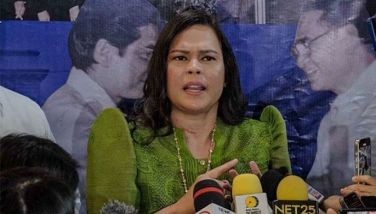ROTC - an important course
While DepEd grapples with the issue of additional school years, CHED confronts the proposal to restore ROTC as a precondition to completion of a college course.
Until the passage of the National Service Law in 2002 (under R.A. 9163), ROTC was a regular offering in tertiary schools for male students. Its curriculum consisted of a one year basic course and an optional additional year for students taking the advance course. It was a mandatory offering and only students who were physically unfit were exempted from taking the program.
With the inception of NSTP, ROTC has become an optional program which together with Literacy Training Service (LTS) and Civic Welfare Training Service (CWTS) constitutes a trilogy of courses under the new law. Being optional, few students choose ROTC, perhaps to avoid the rigorous regimen under this military component. Instead, they take either LTS or CWTS whose requirements consist only of lecture on such areas as teaching literacy and numeracy skills and those related to enhancement of community life. Classroom sessions plus out-campus activities make up the content of the non-military component of NSTP. These of course are very light or less burdensome compared to military oriented activities, and since it is human nature to choose the path of less resistance, most students prefer these to ROTC.
But these students missed the opportunity of getting trained under a discipline-based program conducted by military authorities. They also passed on the chance to get exposed to structured experiences on the development of patriotism and love of country. This is not to say that finishers of LTS or CWTS are less patriotic than ROTC graduates. But shedding one's blood for country and people generally happens in a combat situation and only those who are trained for it are capable of doing so. For we cannot send our NSTP graduates to the battlefield, can we?
Intensive character formation is therefore one advantage ROTC has over the other NSTP features. The training is like a rite of passage from adolescent to adulthood in which the individual is exposed to situations that challenge his determination to go on despite great odds. In the process, he learns the value of humility and obedience to authority along with team work and collaborative spirit.
Toughening of one's physique is of course another benefit one gets from ROTC. Budding soldier that he is, he does rigid workouts including hiking (with full-packed gears and a service rifle), river-forging, swimming, jungle survival treks and others. All these make for an effective seasoning of character - physically, emotionally, and mentally, outcomes which are authentically educational in nature.
With such benefits, the "softening" of the ROTC program under R.A. 9163 was therefore an unfortunate move on the part of Congress. Even if the law does not outrightly scrap it but just makes it optional, the effects upon the quality of educational outcome on young Filipinos have been damaging because, as mentioned, most college students would rather take LTS or CWTS. Now there are college graduates whose patriotic fervor has been left unkindled. "Breathes there the man with soul so dead / Who never to himself has said / This is my own, my nature land." It is not likely that these lines can be said of these young people?
Alarmed by the negative impact of the NSTP law, Congressman Eduardo R. Gullas, who himself is an ROTC-trained reserved officer, filed HB No. 5460 during the 13th Congress. The explanatory statement of the bill says, "The defense of the state is not only the concern of the government but of the people as well. It is important that we prepare our citizens early by instilling in them the values of patriotism, discipline and love for the country..."
As expected, the bill met stiff oppositions from party-list representatives majority of whom belonged to the militant and left-leaning organizations. Oppositions were also expressed by the new generation of legislators who were hesitant to antagonize young voters and lose the latter's support in their reelection bids. Politics - it was mainly because of politics that the NSTP law was passed. Its proponents were aware that getting the support of young voters who constitute a big chunk of the voting population was a big factor in their political agenda. Now it is politics too that stands on the way of restoring ROTC to its former mandatory status.
And so the country faces the bleak prospect of having millions of young people joining the mainstream without sufficient training in self-discipline and love of country.
* * *
Email: [email protected]
- Latest
- Trending
























